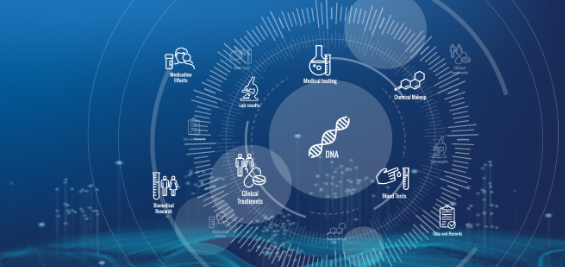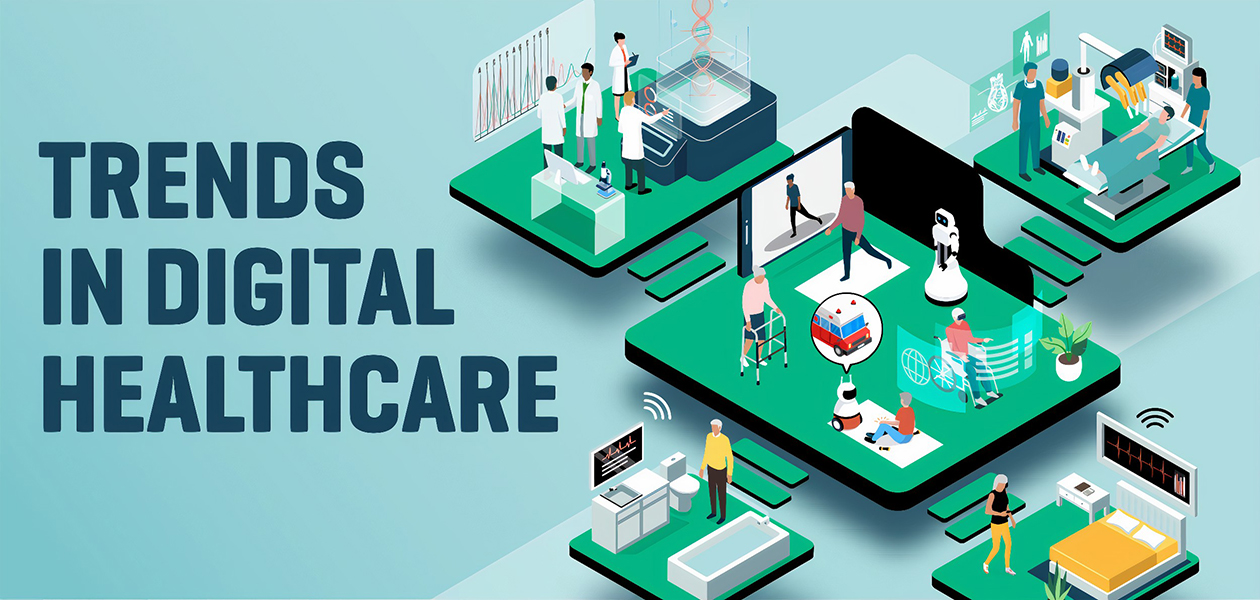Developments in digital technologies and approaches have transformed the healthcare industry and promoted self-management of one’s health. Let’s take a look at what has changed.
The creation of healthcare solutions involves extensive research and development by multiple players from academic institutions, pharmaceutical companies and medical device companies. With looming problems of aging populations and increasing prevalence of chronic diseases, the healthcare sector has to seek ways to innovate to keep up with increased needs.
Fortunately, advances in computer sciences and digital technologies are helping to accelerate the development of healthcare solutions and improve patient outcomes and operational efficiency across the healthcare value chain.
Driving drug discovery

The traditional drug discovery process for a new drug is a lengthy and expensive process, with low certainty of success. Massive libraries of natural or synthetic compounds have to be screened and tested in-vitro and in animal models, before proceeding to clinical trials in humans. It is not uncommon for a drug candidate to fail in clinical trials despite showing promising results earlier. At times, even after a drug had cleared clinical trials, there can still be certain groups of people who suffer from adverse effects after consuming it.
Therefore, it is paramount to increase the chance of successful drug discovery so that resources are not wasted on chasing poor leads. This is where technologies such as high throughput DNA sequencing and high-resolution cellular imaging come into play. The former allows researchers to uncover genetic clues that are relevant to specific disease states and pave the way for personalised medicine, while the latter enables accurate observation of drug effects. Molecular targets for therapeutic compounds, or biomarkers that signal disease, can also be identified using these techniques.
As high throughput DNA sequencing and high-resolution imaging generate vast amounts of human and non-human biomedical data, bioinformatics tools, artificial intelligence (AI) and machine learning techniques are being developed to obtain actionable clinical insights from these big data sets. The results are then fed back to the laboratories for further testing and refinement. Should candidate drug compounds be assessed as safe and effective, they can proceed to clinical trials. Singapore-based Engine Biosciences is one such company that applies machine learning to genomics to accelerate drug discovery.
Often, multicentre clinical trials are conducted before a drug is approved for treatment. AI platforms such as Antidote and Brite Health help to structure clinical trial design and coordination for success.
Accelerating quality patient care in primary and secondary healthcare
![]()
Digital technologies have been increasingly adopted in healthcare services to improve productivity and quality of patient care.
For example, long waiting times to see a doctor are a bugbear. Cadi Scientific offers automated patient management systems to hospitals to reduce patient waiting times and bed turnover times, among other benefits.
In addition, limited or different access to a patient’s medical history hinders accurate clinical decision-making, potentially posing risks to optimal care. Electronic health records that are accessible to healthcare service providers and follow an individual throughout his or her lifetime allows for better clinical diagnoses. Companies like MediBloc, have a platform for processing, using and exchanging medical records among different stakeholders in the healthcare ecosystem. Governments across the globe are also pushing for national electronic repositories of health records. For instance, the National Electronic Health Record (NEHR) system in Singapore was launched in 2011 to facilitate more seamless patient treatment and quality patient outcomes.
To further support value-based care, hospitals are looking to automated pharmacy systems integrated with electronic health records for improved patient engagement. Such innovations include the Outpatient Pharmacy Automation System (OPAS) by Integrated Health Information Systems (IHiS) in Singapore which automates the prescription filling process and improves manual picking accuracy, leading to better management of manpower and drug inventories, quicker and more accurate medication dispensing.
![]()
On the diagnosis and treatment front, new and improved imaging modalities and, faster and more accurate image analysis bring about earlier disease detection. One of the most promising health innovations is the use of AI in medical imaging, not only for image acquisition and processing, but also for image interpretation. Be it ultrasound, MRI, PET or CT scans, AI helps in accelerating image analysis so that radiologists have more time for evaluating the clinical and laboratory contexts of these medical images. For example, MEDO.AI, a Singapore-based start-up, combines AI, three-dimensional imaging technologies and cloud infrastructure to simplify and speed up the diagnosis of common and critical conditions in hospitals. This does not mean the physician is taken out of the loop; rather, the system augments the physician’s ability to make accurate medical assessments. Some companies have gone even further to extend prediction capabilities to their medical imaging software like local start-up See-Mode’s stroke recurrence prediction capabilities.
Promising benefits of safer, less-invasive procedures and faster patient recovery times, surgical robots are fast becoming more prevalent in hospital practices. Home-grown start-up EndoMaster has a robotic endoscopy system to assist surgeons in removing gastro-intestinal tumours effectively from just a small surgical incision. The robotic system also helps to alleviate the surgeon’s physical burden as they no longer have to spend long durations bending over patients.
Promoting remote care, in real time
![]()
Enabled by digitalisation, value-based healthcare now extends beyond primary and secondary healthcare settings to the comfort of a patient’s home. Telehealth technologies enhance individuals’ access to patient care and augment healthcare providers in the remote monitoring of their patient’s disease or condition.
For Singapore company ConnectedLife, their platform brings together health data such as blood pressure, temperature, blood glucose etc. from various biomarker devices and wearables. This empowers individuals to have a more effective monitoring and management of their condition, together with their families and physicians. With such remote monitoring platforms, patients can look forward to shorter hospital stays and physicians will have the peace of mind in tracking their recovery, intervening if necessary. Furthermore, virtual and augmented reality-enabled devices and therapy, conducted in the comfort of their homes, motivates and engages patients.
Besides providing higher quality care to patients, healthcare innovations can also improve the quality of life for the healthy yet vulnerable groups of the population such as the elderly. For the elderly living alone, internet-of-things devices such as Aeyesafe's Monitoring Alert system uses thermal, radar and sound to track their motions and detect falls, whilst preserving their privacy and dignity. Easy and rapid access to medication from their homes no longer seems impossible, with companies like Yonah exploring the use of unmanned aerial vehicles to dispense medical supplies to specific locations.
As the saying goes: prevention is better than cure. Intelligent home appliances and features, together with wearables, empower individuals in their own health monitoring. In the near future, smart mirrors capable of monitoring facial changes or smart toilet seats capturing an individual’s vital signs could indicate early warning signs of disease.
Digital technology has opened up many possibilities for the drug makers; hospitals and primary care institutes; patients and even individuals seeking a more active role in managing their own health and well-being. Yet, it still holds potential for new developments. Therefore, it is no surprise that the health technology sector is expected to grow at an annual rate of 15.9 percent between 2016-2021, with an estimated market value of US$280 billion. For an overview of the impact of digital technology on healthcare, click the button below to download the infographic.
Make an impact, improve lives
Digital technology is just one enabler to achieve value-based healthcare. If you are looking to harness innovation to stay ahead in a rapidly evolving healthcare market, contact IPI or IPI’s partner Singapore Health Technologies Consortium (HealthTEC)* at [email protected].
* Launched in July 2019, the Singapore Health Technologies Consortium (HealthTEC) offers a platform for interaction and collaboration between industry and academia to develop and translate disruptive technological innovations that will transform health and wellness. It focuses on the areas of health sensing technologies, health analytics and artificial intelligence to create personalised applications for health and wellness. HealthTEC is supported by the National Research Foundation (NRF) and hosted at the Institute for Health Innovation and Technology (iHealthtech), National University of Singapore (NUS).


